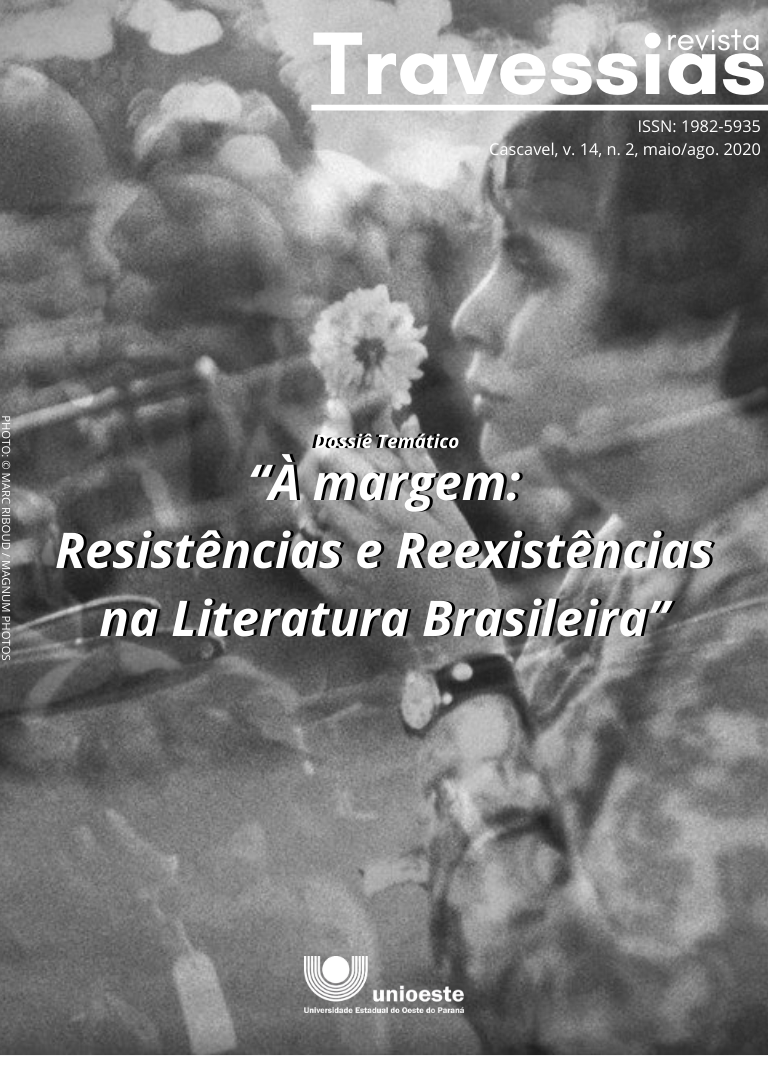Resistência em campo de batalha: a vida dos marginalizados em Capão Pecado
DOI:
https://doi.org/10.48075/rt.v14i2.25358Palavras-chave:
Cultura, Alienação, Luta, Marginalizados.Resumo
Este artigo propõe uma reflexão acerca da vida e da representação cultural dos marginalizados na obra Capão Pecado, bem como as relações culturais que constitui diálogos conflituosos. O principal foco é apresentar como o romance trabalha a resistência da cultura periférica em um campo de batalha contra a influência de fatores externos à comunidade. Diante disso, objetiva-se, de modo geral, analisar os discursos que se desenvolve ao longo da obra como pontos de resistência à massificação cultural. De modo específico; mostrar como a literatura marginal tem reivindicado um espaço na produção literária que dê voz aos moradores marginalizados, perceber o trabalho discursivo na busca de uma afirmação sociocultural, posto como militância, e evidenciar a luta contra fatores sociais que condicionam a localidade periférica a percorrer a criminalidade. Assim, para o desenvolvimento do presente estudo, a metodologia apresentada compõe uma pesquisa bibliográfica de cunho explicativo, na qual utiliza-se como pressupostos teóricos os postulados Dalcastagné (2007), Tamagnone (2013), Goffman (1985), Fianco (2010), Hall (2006), entre outros. Como resultados obtidos, constatou-se que a obra apresenta um aparato discursivo que reflete sobre as condições que enquadra a vida dos moradores de periferia a uma realidade cotidiana, na qual a criminalidade se constitui com um produto cultural de pobreza ao lado da cultura do hip-hop, ao mesmo tempo que essas localidades buscam seus direitos e sua singularidade, sobre constante luta as influências externas que tende ao apagamento de sua subjetividade através da alienação cultural.Downloads
Referências
ADORNO, Theodor W. Mínima moralia. Tradução de Artur Morão. Lisboa: EDIÇÕES 70, 1951.
BAKHTIN, Mikhail Mikhailovitch. A estética da criação verbal. 4. ed. Tradução de Paulo Bezerra. São Paulo: Martins Fontes, 2003.
CANDIDO, Antônio. O direito à literatura. In: Candido, Antonio (org.). Vários escritos. 4. ed. Rio de Janeiro: Ouro sobre Azul, 2004.
COMPAGNON, Antoine. O demônio da teoria: literatura e senso comum. Tradução de Cleonice Paes Barreto Mourão. Belo Horizonte: Ed. UFMG, 1999.
DALCASTAGNÈ, Regina. A auto-representação de grupos marginalizados: tensões e estratégias na narrativa contemporânea. Letras de Hoje. Porto Alegre, v. 42, n. 4, p. 18-31, dezembro de 2007.
DIÓGENES, Glória. Cartografia da cultura e da violência: Gangues, galeras e o movimento hip-hop. São Paulo: Annablume,1998.
FERNANDEZ, Atahualpa; FERNANDEZ, Athus. Meritocracia e desigualdade. [S.l.:s.n.] 2015. Disponível em: <https://www.researchgate.net/publication/271209358_MERITOCRACIA_E_DESIGUALDADE>. Acesso em 09 de junho de 2020.
FERRÉZ. Capão Pecado. Rio de Janeiro: Objetiva, 2005.
FIANCO, Francisco. Adorno: Ideologia, cultura de massa e crise da subjetividade. Revista Estudos Filosóficos. São João del-Rei-MG, n. 4, Pág. 128 – 142, 2010.
GOFFMAN, Erving. Estigma: notas sobre a manipulação da identidade deteriorada. Tradução de Mathias Lambert. Rio de Janeiro: LTC, 1985.
HALL, Stuart. A identidade cultural na pós-modernidade. Tradução de Tomaz Tadeu da Silva e Guaraci Lopes Louro. 11. ed. Rio de Janeiro: DP&A, 2006.
MELO, Clarissa Damasceno; RODRIGUES, Inara de Oliveira. Violência, criminalização e genocídio em Capão Pecado. Revista Crioula. São Paulo, n. 23, Pág. 278 – 299, 2019.
OLIVEIRA, Susan de. “Isso aqui é uma guerra”: o RAP de protesto no Brasil. In: SITOE, Tirso; GUERRA, Paula (orgs.). Reinventar o discurso e o
palco: O rap, entre saberes locais e saberes globais. 1. ed. Porto: Universidade do
Porto, 2019.
TAMAGNONE, Diego; OLIVEIRA, Rejane Pivetta de. A igualdade da lei e a diferença da literatura: a narrativa marginal de Ferréz. Revista Língua & Literatura. Rio Grande do Sul, v. 15, n. 24, p. 1-289, Ago. 2013.
Downloads
Publicado
Como Citar
Edição
Seção
Licença
Aviso de Direito Autoral Creative Commons
Política para Periódicos de Acesso Livre
Autores que publicam nesta revista concordam com os seguintes termos:
1. Autores mantêm os direitos autorais e concedem à revista o direito de primeira publicação, com o trabalho simultaneamente licenciado sob a Licença Creative Commons Attribution que permite o compartilhamento do trabalho com reconhecimento da autoria e publicação inicial nesta revista.
2. Autores têm autorização para assumir contratos adicionais separadamente, para distribuição não-exclusiva da versão do trabalho publicada nesta revista (ex.: publicar em repositório institucional ou como capítulo de livro), com reconhecimento de autoria e publicação inicial nesta revista.
3. Autores têm permissão e são estimulados a publicar e distribuir seu trabalho online (ex.: em repositórios institucionais ou na sua página pessoal) a qualquer ponto antes ou durante o processo editorial, já que isso pode gerar alterações produtivas, bem como aumentar o impacto e a citação do trabalho publicado (Veja O Efeito do Acesso Livre).
Licença Creative Commons
Esta obra está licenciada com uma Licença Creative Commons Atribuição-NãoComercial-CompartilhaIgual 4.0 Internacional, o que permite compartilhar, copiar, distribuir, exibir, reproduzir, a totalidade ou partes desde que não tenha objetivo comercial e sejam citados os autores e a fonte.



